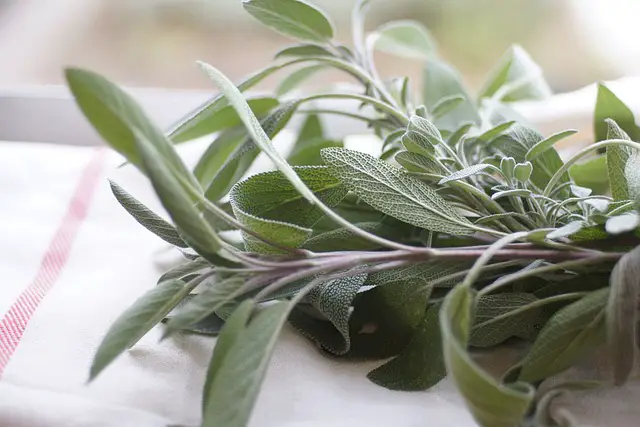Bearded dragons are a popular pet reptile due to their docile nature and unique appearance. However, as an omnivorous species, bearded dragons require a varied diet to maintain their health and well-being.
While many fruits and vegetables are safe for bearded dragons, pet owners often wonder about feeding their dragon’s certain herbs, such as sage.
Sage is a common herb used in cooking and used for medicinal purposes for centuries. As a member of the mint family, sage has a strong aroma and flavor that can enhance the taste of many dishes.
However, pet owners should exercise caution when feeding sage to bearded dragons and consider the potential risks and benefits.
Can Bearded Dragons Eat Sage?
What is Sage?
Sage is a herb commonly used in cooking with a distinct aroma and flavor. It is a member of the mint family known for its medicinal properties. Sage leaves are typically grayish-green in color and have a slightly fuzzy texture.
Is Sage Safe for Bearded Dragons to Eat?
Bearded dragons can eat sage in moderation.
However, it is essential to note that sage should not be a staple of their diet. This is because Sage contains a lot of calcium, which can benefit bearded dragons, but too much calcium can lead to health problems such as metabolic bone disease.
Also, sage contains a small amount of oxalates, which can bind to calcium and prevent absorption. However, this can also lead to health problems if consumed in excess.
Benefits of Feeding Sage to Bearded Dragons
Feeding sage to bearded dragons can provide some health benefits. As mentioned earlier, sage contains high calcium, essential for bone health.
Sage also contains antioxidants, which can help boost the immune system and protect against disease. In addition, sage has anti-inflammatory properties, which can help reduce swelling and pain.
While bearded dragons can eat sage moderately, it should not be a diet staple. As with any new food, it is important to introduce it slowly and monitor your bearded dragon for any adverse reactions.
Other Foods for Bearded Dragons
Safe Foods for Bearded Dragons
Bearded dragons are omnivorous, which means they eat both plants and animals. They require a balanced diet to stay healthy. Here are some safe foods that bearded dragons can eat:
- Leafy greens such as kale, collard greens, mustard greens, and turnip greens
- Vegetables such as squash, bell peppers, carrots, and sweet potatoes
- Fruits such as apples, bananas, and berries (in moderation)
- Insects such as crickets, mealworms, and dubia roaches (make sure they are gut-loaded and dusted with calcium and vitamin D3 supplements)
It is crucial to provide various foods to ensure they receive all the necessary nutrients. In addition, bearded dragons should always have access to fresh, clean water.
Foods to Avoid Feeding Bearded Dragons
While there are many safe foods for bearded dragons, there are also some foods that should be avoided:
- Avocado – contains persin, which is toxic to bearded dragons
- Rhubarb – contains oxalic acid, which can bind with calcium and lead to metabolic bone disease
- Citrus fruits – can cause mouth sores and digestive issues
- Spinach – contains oxalic acid and can bind with calcium
- Fireflies – contain toxins that can be deadly to bearded dragons
It is also important to avoid feeding bearded dragons wild-caught insects, as they may have been exposed to pesticides or other harmful substances.
Feeding Schedule for Bearded Dragons
Bearded dragons are omnivores, which means they eat both plants and animals. Therefore, a balanced and varied diet is essential to keep them healthy. A good feeding schedule for bearded dragons is as follows:
- Young bearded dragons (0-4 months): Feed them 2-3 times a day with a mix of insects and vegetables.
- Juvenile bearded dragons (4-12 months): Feed them once a day with a mix of insects and vegetables.
- Adult bearded dragons (12+ months): Feed them every other day with a mix of insects and vegetables.
It is vital to provide fresh food and clean water every day. Bearded dragons also need calcium and vitamin supplements to stay healthy. Dust their food with calcium and vitamin supplements once or twice a week.
Here are some tips on feeding bearded dragons:
- Offer a variety of insects such as crickets, mealworms, and dubia roaches.
- Feed them vegetables such as kale, collard greens, and butternut squash.
- Avoid feeding them spinach or iceberg lettuce as they are low in nutrients and can cause health problems.
- Please do not feed them wild-caught insects, as they may carry parasites or diseases.
- Remove any uneaten food after 15-20 minutes to prevent spoilage and bacterial growth.
- Observe their eating habits and adjust the feeding schedule accordingly.




